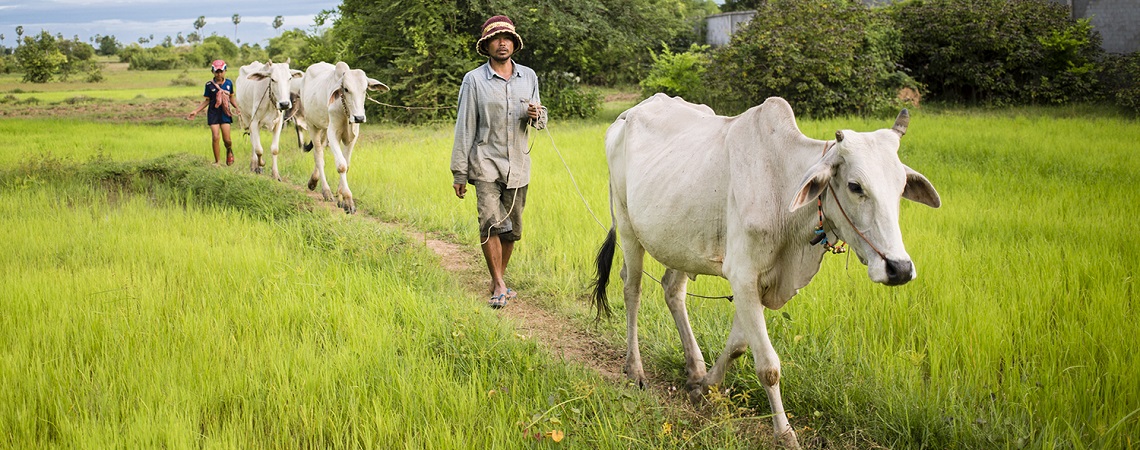
Photo:
The Kingdom of Cambodia is situated in mainland Southeast Asia with a population of over 14 million people, and with approximately 80 percent of this population living in rural areas. The agriculture sector makes up a third of GDP and employs 57 percent of the country’s labor force. Approximately 80 percent of the country’s population lives along the Mekong River and Tonle Sap Lake, where flooding occurs due to increased water levels between early July and early October. Disruptions to logistical corridors caused by floods have a profound impact on agricultural supply chains, both domestically and for international trade. At the same time, 39 percent of the country's total GHG emissions come from the agriculture and land use sectors.
- National
- Regional
- Global
- Country Office
- National Governments
- United Nations Development Programme (UNDP)
- Food and Agriculture Organization of the United Nations (FAO)
- BMUV/IKI
- Image

Cambodia initiated its National Adaptation Plan (NAP) Financing Framework and Implementation Plan in 2017. Cambodia’s developing agri-business environment also needs assistance for enhancing sustainability, and the Cambodia Partnership for Sustainable Agriculture (CPSA) is paving the path for the sector, for targeted interventions in its value chains, such as rice, sugar cane, and cassava. Cambodia submitted its updated Nationally Determined Contribution (NDC) to the UNFCCC in December 2020, which outlined adaptation and mitigation goals in the agriculture and land use sectors. The NDC has 17 prioritized adaptation actions under agriculture, focusing on agribusiness, the development of rice and other cash crops, horticulture, livestock aquaculture production. The NDC adaptation component outlined the need for agriculture support services, capacity building, enhanced institutional arrangements, the development of new technologies and increased research. Cambodia prioritized mitigation actions under the forestry and other land use (FOLU) sectors intending to reduce 50 percent of emissions by 2030 via the REDD+ programme. The Ministry of Agriculture, Forestry and Fisheries (MAFF) and other relevant ministries will also undertake a bio-digester programme as part of the mitigation actions outlined in the updated NDC.
A key barrier for climate actions in Cambodia is limited resources: human, technical and financial resources, which could be enhanced with support from development partners and private sector financing. There is also a need to enhance capacity and technical skills in data and information collection and management, particularly for Measuring, Reporting and Verification (MRV). In Cambodia, some of the other barriers include limited staff capacity at the sub-national levels for the implementation of adaptation and mitigation actions, as well as coordination with line ministries and other stakeholders (civil society, community-based organizations, NGOs, and the private sector) to ensure that efforts and resources are concerted, and synergies are leveraged.
In Cambodia, the SCALA programme is helping to transition agriculture toward more sustainable, climate-resilient practices. A value chain analysis was launched in Steung Treng Province to identify forest-risk commodities that drive deforestation, with cashew, cassava, and rice shortlisted for further study. SCALA supported the government’s preparation of the Biennial Transparency Report (BTR1) to the UNFCCC, including contributions to greenhouse gas inventory and adaptation reporting. A feasibility study was also conducted to explore the introduction of carbon offset projects in forest communities, laying the groundwork for alignment with recognized carbon standards.
To support long-term transformation, a national strategy for sustainable agricultural value chains was developed through consultations with government, private sector, NGOs, and academia. The strategy aims to boost agricultural exports while safeguarding the environment and advancing climate resilience. Three concept notes were prepared to support entrepreneurship, circular economy principles, and the implementation of climate policies in agriculture and land use. These proposals are intended to attract future investment and partnership opportunities.
Capacity building is another key focus of SCALA’s work in Cambodia. In October 2024, 25 government representatives were trained in the use of the NEXT Tool to align climate mitigation scenarios in agriculture, forestry, and land use. SCALA is also supporting Cambodia’s upcoming NDC update by contributing evidence from ongoing work, aligning with the country’s NDC 3.0 roadmap for 2025. Additionally, SCALA contributed to national consultations on the updated National Strategic Plan on Climate Change, which is expected to serve as Cambodia’s revised National Adaptation Plan (NAP).
Moving ahead, SCALA in Cambodia aims to:
- Finalize and apply findings from a participatory systems-level assessment on livestock systems, conducted with the Royal University of Agriculture, to inform strategies that strengthen community resilience, such as through the GEF-8 project on biodiversity-friendly crop-livestock systems in Cambodia’s protected landscapes (Beoung Per and Prey Lang Wildlife Sanctuaries).
- Continue collaboration with Cambodia’s NDC Partnership (NDC-P) and contribute to the Adaptation Pipeline Accelerator and REDD+ initiatives.
- Align activities with the UN System’s Climate Promise 2025 to enhance support for Cambodia’s Nationally Determined Contribution (NDC) implementation.
- Identify policy and financial de-risking measures and business opportunities for private sector engagement in climate action within the forestry and livestock value chains – this involves considering the social, financial, and environmental impacts of these supply chains and the opportunities to strengthen the partnership for sustainable development, while promoting the sharing of knowledge, technology, and resources.









